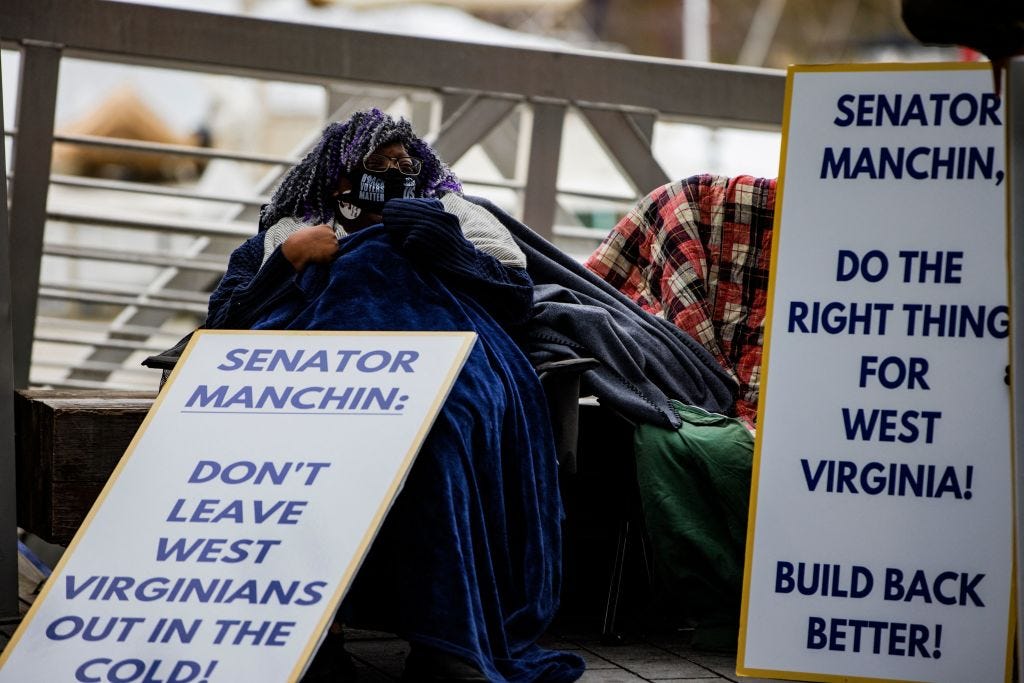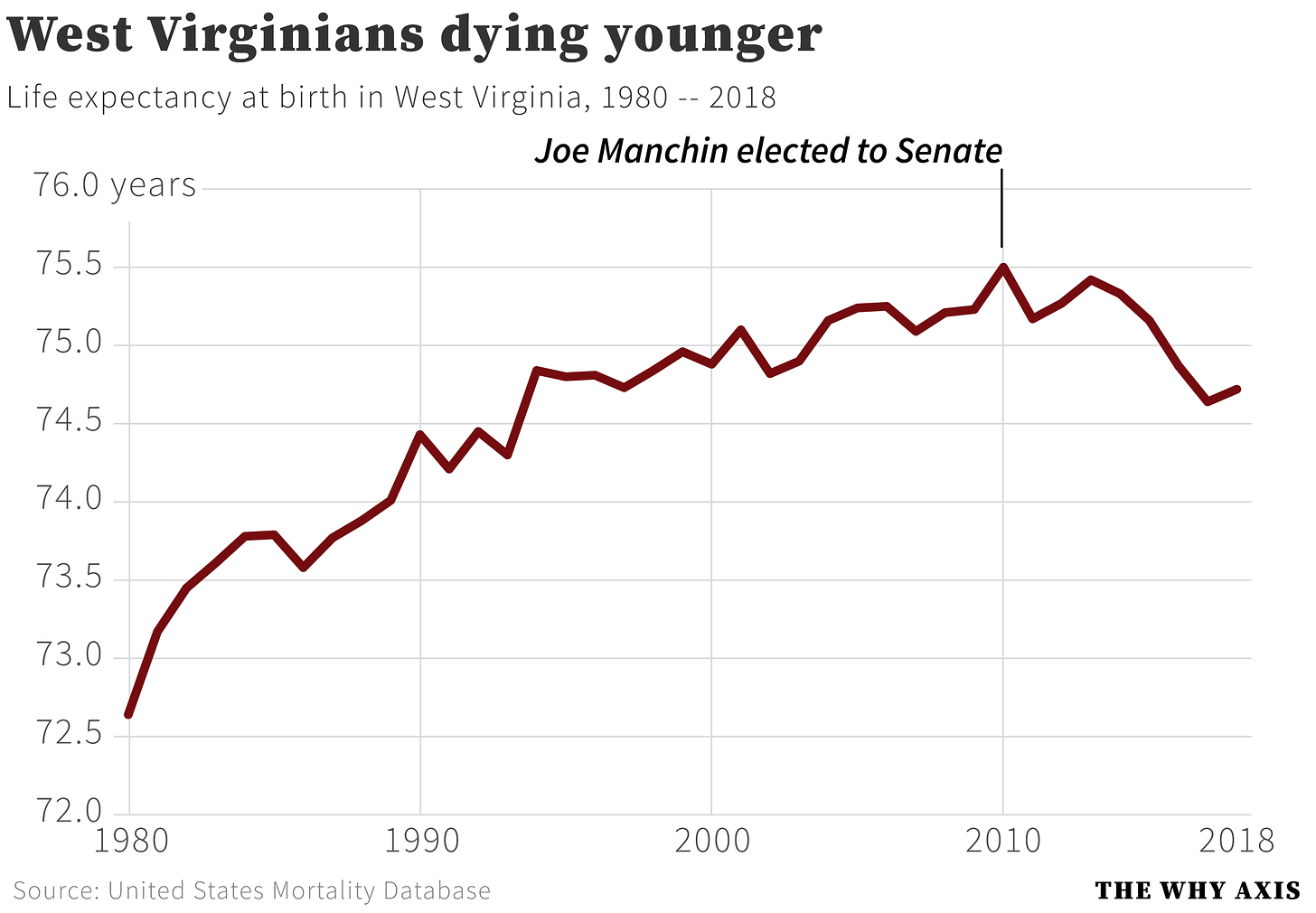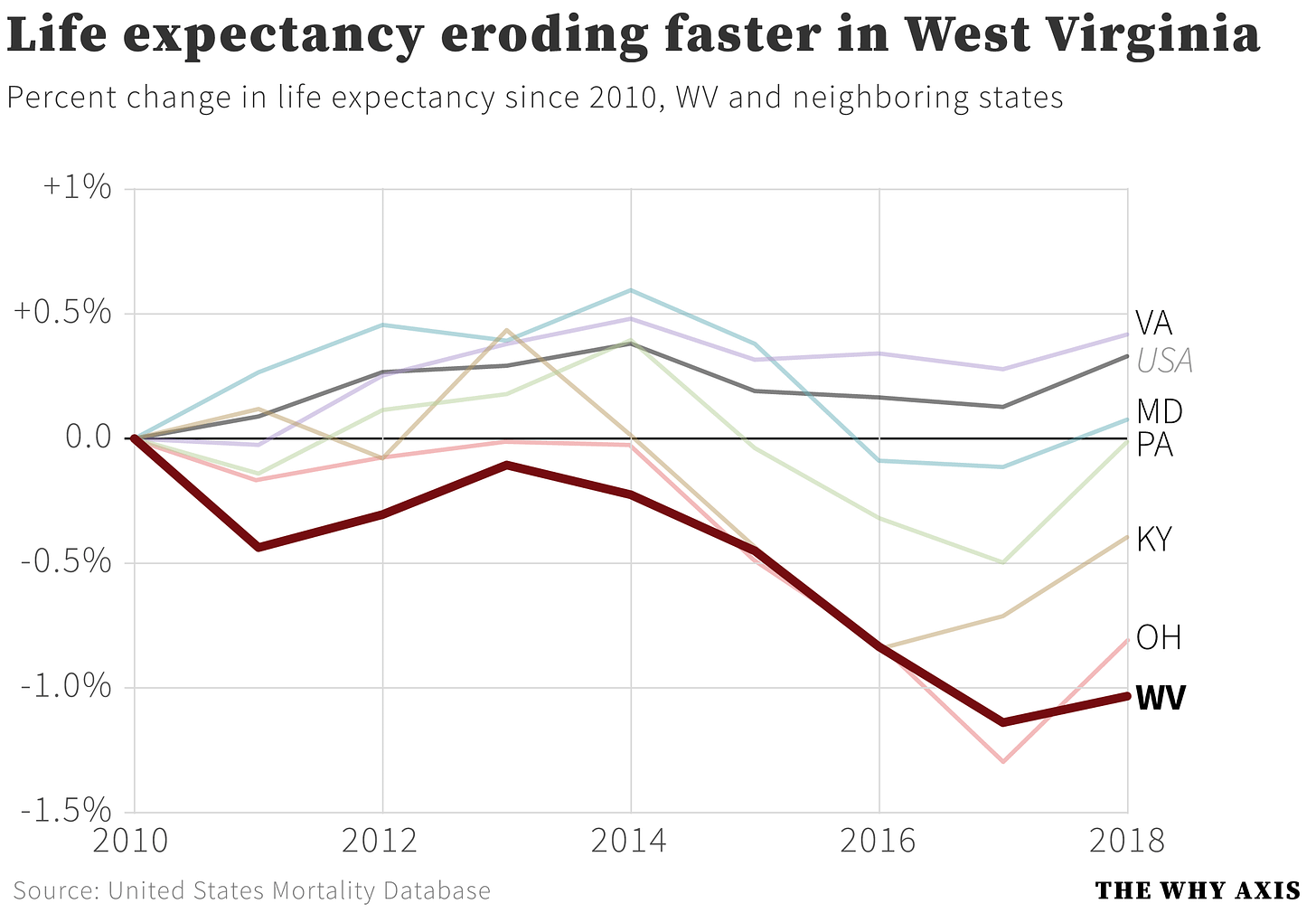What has Joe Manchin done for West Virginia?
Life expectancy in the state peaked the year he was elected to the Senate, and has been falling ever since

West Virginia has the lowest life expectancy in the United States, at 74.4 years, according to the CDC. Lives in the state are, on average, about 6 or 7 years shorter than lifespans in Hawaii, the longest-living state. If West Virginia were a country it would be ranked around 80th in the world for longevity, somewhere between Bangladesh and Belarus.
Life expectancies across the U.S. have fallen in recent years, especially with the pandemic. But the decline in West Virginia is steeper and has been going on for longer than elsewhere. Lives there have been growing shorter for roughly a decade, according to data from the United States Mortality Database, a project run by a demographer at U.C. Berkeley. It hit its peak in 2010 at 75.5 years and has been falling ever since.
Incidentally, 2010 was the year Joe Manchin was first elected to the Senate.
Manchin is making headlines at the moment for unilaterally torpedoing the Democrats’ domestic policy agenda. The Build Back Better Act would, among other things, take steps toward providing universal pre-school care in the U.S., help families pay for childcare in general, cover hearing aids for seniors on Medicare, allow the federal government to negotiate lower prescription drug prices, provide additional health care subsidies for low and middle-income families, and require employers to offer paid medical leave for their employees.
Perhaps most importantly, the bill would extend this year’s generous and near-universal child tax credit payments to families, which many leading economists believe is one of the federal government’s most effective poverty-fighting tools.
The provisions would be almost entirely paid for by various tax hikes on the rich and provisions to beef up IRS enforcement on tax-dodgers. And they would be extremely beneficial to Manchin’s constituents, who reside in one of the poorest states in the U.S. But Manchin is balking nonetheless, framing his opposition to it mostly in terms of concerns about the national debt, which in a statement he called the “greatest threat facing our nation.”
Manchin’s being disingenuous about this — he has no problem adding trillions to the debt in support of policies that he likes — but the development is a good occasion to stop and ask what, exactly, he’s done for West Virginia since they sent him to the Senate in 2010.
Life expectancy is a great and under-utilized measure of overall well-being in a given place. Economic stats are useful too, of course, but things like GDP and stock market performance often simply end up reflecting how the wealthy are doing. The point of an economy and a stock market, theoretically at least, is to create the conditions for people to live their best possible lives. To support “life, liberty and the pursuit of happiness.” Life expectancy is an excellent barometer of how well that pursuit is going. Dramatic gains in longevity around the world in the past century are rightly viewed as a landmark sign of human flourishing and progress.
This, of course, makes it all the more concerning when life expectancy falls — it’s an indicator that something is going terribly wrong. West Virginia’s decline is a reflection of a lot of different things — the opioid epidemic, of course. Poor health. Little economic opportunity. High rates of suicide. Despair.
Joe Manchin can’t wave a magic wand and fix all these things, which have roots decades, even centuries in the past. But people elect lawmakers in the hope that they’ll use the power they’ve been granted to make things better. As a U.S. Senator from a relatively small rural state, Manchin has a lot more of that power than the average elected official. And during his time in the Senate, life in West Virginia has become shorter, meaner and more desperate.
In fact, the situation is deteriorating faster in West Virginia than in its neighbors. West Virginians lost close to 10 months of lifespan between 2010 and 2018, the latest year with available state-level data. Percentage-wise that’s more than twice the loss of life expectancy than in neighboring Kentucky. Maryland and Pennsylvania are basically flat. People in Regular Virginia, as in the US overall, saw their lifespans grow modestly over this period. Only Ohio — facing similar opioid difficulties — has posted a life expectancy loss on par with West Virginia’s.
This suggests there’s something uniquely terrible happening in the state, and that whatever Manchin’s doing, it hasn’t been enough.
So what can he do?
Well, research tells us that people live longer lives when they have better access to health care. Early childhood education is linked to longevity as well. And the association between poverty and shorter lives is simply massive.
If I were a lawmaker looking for ways to improve lives in a struggling state, I’d probably look for policies that make health care more affordable, broaden access to quality childcare, and reduce childhood poverty. That’s exactly what the Build Back Better Act does. But Manchin — a literal coal baron who lives on a yacht — just pulled the plug on it, suggesting that improving his constituents’ lives may not be his primary concern in office.
Which is enough to make you wonder: what is?
Looking for a last-minute gift for the chart-lover, authoritarian-hater or otherwise cool person in your life? Gift a subscription to The Why Axis!





I would say the things that matter to Manchin are money, the power he has at the moment, money, saying “Fuck you, that’s why” to everyone he deigns beneath him, money and money.